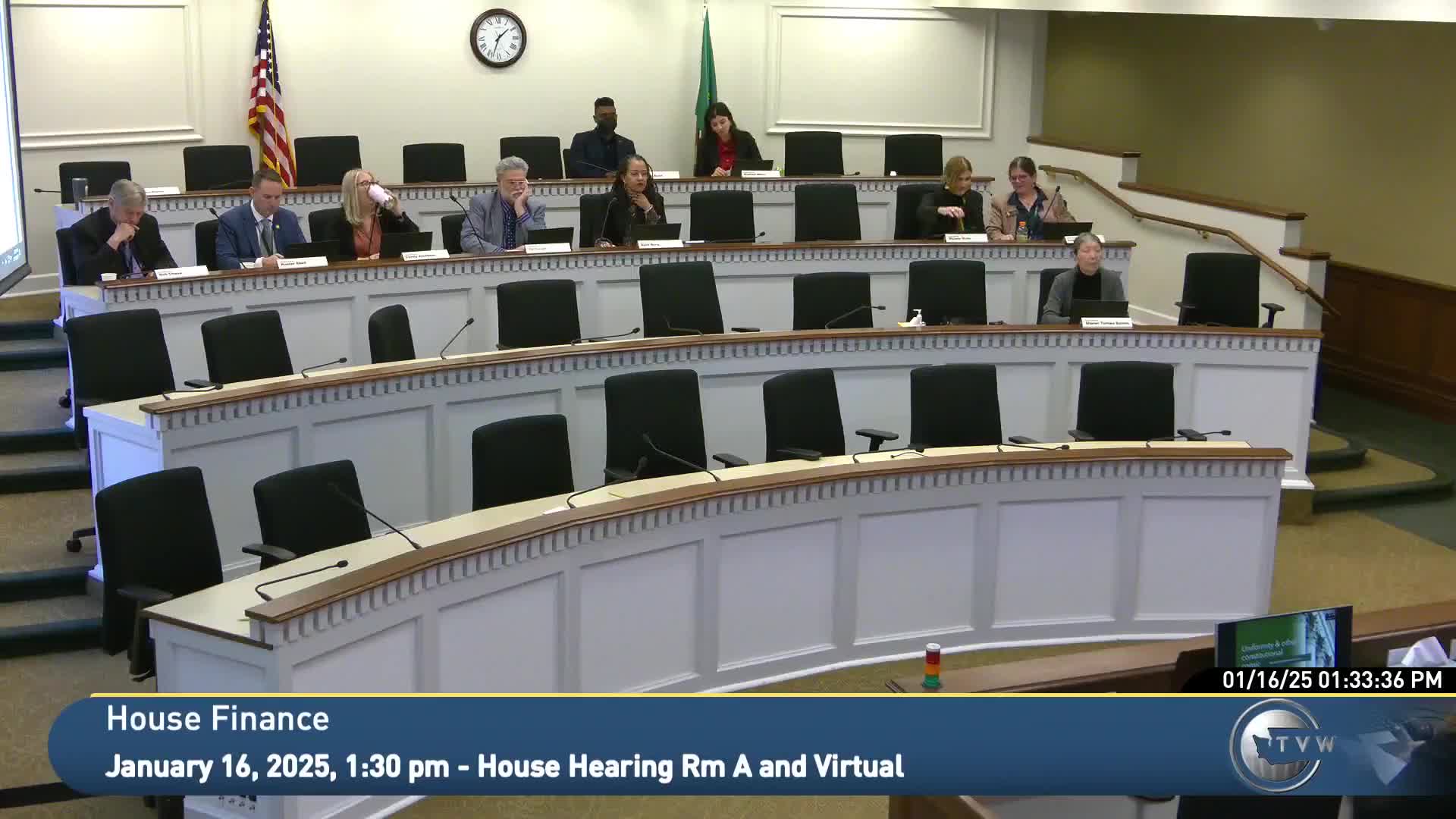House Finance committee hears bill to raise business personal-property exemption to $50,000
Get AI-powered insights, summaries, and transcripts
Subscribe
Summary
Tracy Taylor, staff of the committee, gave a constitutional and statutory overview of Washington tax law and then briefed the House Finance Committee on House Bill 1004 and House Joint Resolution 4200, which together would raise the statewide business personal-property tax exemption from $15,000 to $50,000 and remove the current “head of family” limitation.
Tracy Taylor, staff of the committee, gave a constitutional and statutory overview of Washington tax law and then briefed the House Finance Committee on House Bill 1004 and House Joint Resolution 4200, which together would raise the statewide business personal-property tax exemption from $15,000 to $50,000 and remove the current “head of family” limitation.
The bills were presented jointly during a January 16 House Finance work session and public hearing. Taylor told the committee the constitutional amendment (HJR 4200) must pass the Legislature by a two-thirds vote in both chambers and then be approved by a majority of voters; HB 1004 would make the implementing statutory changes if the amendment is adopted.
Why it matters: supporters said the change would reduce paperwork for small businesses and for county assessors and treasurers, and would shift only a modest amount of property-tax burden to other taxpayers. Opponents warned that any increase in exemptions shifts taxes to other property owners and urged preservation of existing property-tax limits.
Taylor opened the session with a review of constitutional constraints on state taxation, including Article II and Article VII of the Washington Constitution and state case law distinguishing property taxes (levied on ownership) from excise taxes (levied on the privilege of doing business). She explained the current $15,000 personal-property exemption originated in statute and that counties administer personal-property assessments, noting examples of case law cited during the presentation, including Culliton and Quinn v. Department of Revenue.
Sponsors described the bill as small-business relief. Representative Marie Levitt, sponsor, said the proposal “really promotes our small businesses across our state,” and argued the change would both reduce administrative burden on small businesses and save county staff time. Representative Schmidt, a co-sponsor, said the exemption would simplify filing and recordkeeping for many small employers and noted county assessor offices currently do considerable manual data entry.
County assessors and local government officials testified in support. Michael M. Moran testified on behalf of King County Assessor John Wilson. Thurston County Assessor Stephen Drew said the exemption would produce administrative savings and estimated the county combined property-tax levy at about $9.83 per $1,000; he added that the exemption would “exempting the value of up to $500 per business” in a typical case where $50,000 of taxable value is removed. Jennifer Wallace, executive director of the Washington Association of County Officials, said the change is “a common sense update to an outdated threshold that will ease administrative burden and provide some relief to small businesses.”
Business groups also urged passage. Mark Johnson of the Washington Retail Association said the change would mainly help local retailers and sole proprietors. Max Martin of the Association of Washington Business and Patrick Connor of NFIB said most small businesses would benefit and that county processing costs for small accounts would fall.
Fiscal and technical details presented to the committee: Taylor summarized fiscal-note figures prepared by the Department of Revenue. The fiscal note projects a statewide shift (not a loss to the state property-tax levy) estimated at about $3,000,000 for fiscal year 2027 and $5,700,000 for fiscal year 2028; the Department of Revenue estimated implementation costs of $67,200 in fiscal year 2026 and $12,000 in fiscal year 2027 with no ongoing costs. Local-government impacts were described as shifting revenue among counties, cities and special districts; the fiscal note presents shifts by calendar year and by fiscal year and breaks those shifts out for local jurisdictions.
Committee members asked technical and scope questions. Members clarified that the statute currently exempts household goods used by a homeowner and that the personal-property tax targeted by the bills applies only to business-owned personal property (not typical household items). Members asked whether trailers and mobile homes can be taxed as personal property (assessors said mobile homes not affixed to land can be taxed as personal property and that such occurrences are rare). Members also asked about indexing the exemption; staff said the constitutionally fixed dollar amount could be drafted differently but was currently a fixed figure in the constitution, and that indexing had not been included in the draft legislation.
One public testifier opposed the measure. Lori Lane said, “We are taxed enough already… Do not pass this bill.” The committee closed the public hearing on both measures without a recorded vote and adjourned; no final committee action on either bill was recorded during the hearing.
What’s next: HJR 4200 would require a two-thirds legislative vote and then voter approval to amend the state constitution. HB 1004 contains implementing statutory language and fiscal-note detail; if the constitutional amendment proceeds, the statutory changes would take effect under the bill’s terms.
Sources: Committee presentation and public hearing testimony, House Finance Committee, Jan. 16, 2025. Direct quotes in this article are attributed to speakers appearing in the committee record.
